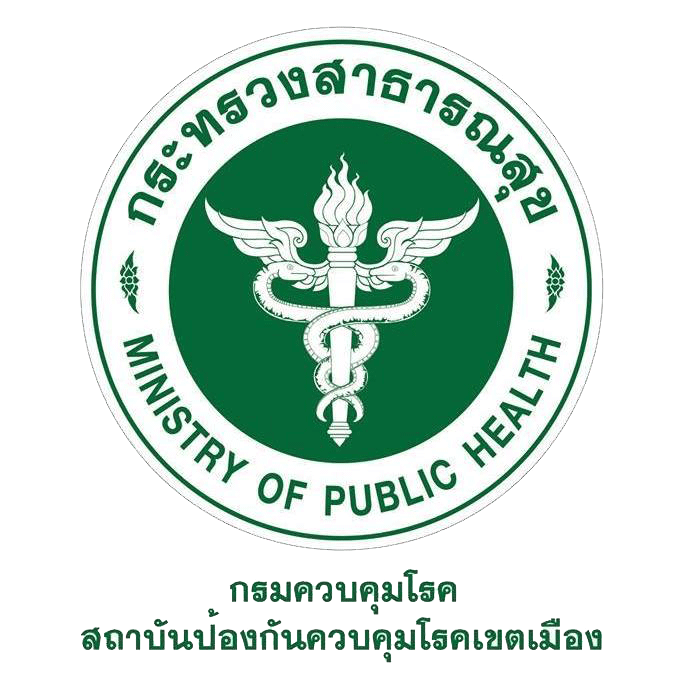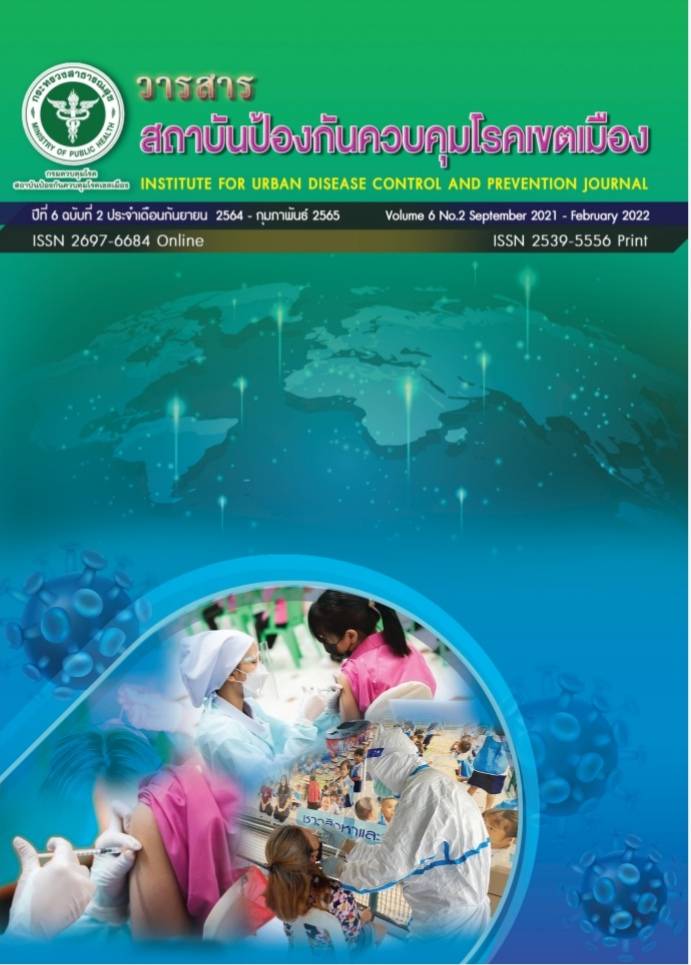Intention to vaccinate against COVID-19 of high school students aged 16-18 years old in Thailand: Cross sectional online survey
Main Article Content
บทคัดย่อ
ความสำคัญของปัญหา: COVID-19 เกิดการระบาดใหญ่ทั่วโลก การพัฒนาวัคซีนดำเนินไปควบคู่กับการควบคุมการระบาดอย่างรวดเร็วเมื่อวัคซีนพร้อมในการนำมาฉีดให้ประชาชนจำเป็นที่ประชาชนรับวัคซีนให้ความครอบคลุมสูงสุดเพื่อสร้างภูมิคุ้มกันหมู่และควบคุมการระบาดของ COVID-19 นโยบายการจัดหาวัคซีนที่มีข้อจำกัดด้านตัวเลือกส่งผลต่อความเต็มใจรับวัคซีนของประชาชน โดยเฉพาะกลุ่มอายุตํ่ากว่า 18 ปี ที่ยังไม่มีการจัดหาวัคซีนที่เหมาะสม ในขณะที่การค้นพบใหม่ๆ เกิดขึ้นจากโรคอุบัติใหม่นี้ตลอดเวลา ความรู้และความเข้าใจ ส่งผลต่อความตระหนักและการรับรู้ความเสี่ยงต่ออันตรายจากโรควัตถุประสงค์: เพื่อประเมินความรู้ความเข้าใจเกี่ยวกับ COVID-19 การรับรู้ความเสี่ยงติด COVID-19 ความตั้งใจรับวัคซีนป้องกัน COVID-19 และ เพื่อศึกษาปัจจัยทำนายและสาเหตุของความลังเล ในการรับวัคซีน COVID-19 กลุ่มตัวอย่าง คือนักเรียนมัธยมปลายอายุ 16-18 ปี ที่อาศัยอยู่ในประเทศไทย วิธีการศึกษา: แบบสำรวจออนไลน์แบบภาคตัดขวาง จัดทำตั้งแต่เดือนเมษายน 2564 ถึง มิถุนายน 2564 ประชากรและกลุ่มตัวอย่าง: นักเรียนมัธยมศึกษาตอนปลายอายุ 16-18 ปี คนทั่วประเทศไทยที่สามารถเข้าถึงอินเทอร์เน็ตผ่านสมาร์ทโฟนหรือคอมพิวเตอร์ส่วนบุคคลได้ ผลวิจัย: มีผู้เข้าร่วมการวิจัยจำนวน 2,173 ราย อายุระหว่าง 16-18 ปี ส่วนใหญ่เป็นเพศหญิง (n=1,577, 72.57%) คะแนนเฉลี่ยระดับความรู้เกี่ยวกับ COVID-19 อยู่ระดับกลาง (M=7.83, SD=1.38) จากคะแนนเต็ม 10 การรับรู้ความเสี่ยงติด COVID-19 อยู่ระดับตํ่า (M=2.83 , SD=1.09) และ ความตั้งใจรับวัคซีน COVID-19 โดย 23.6% (n = 513) ของผู้เข้าร่วมจะรับการฉีดวัคซีน 40.9% (n = 889) ไม่แน่ใจ 35.48% (n = 771) ไม่ต้องการรับการฉีดวัคซีน ปัจจัยที่เกี่ยวข้องต่อความลังเลการรับวัคซีน ("ไม่แน่ใจ" หรือ "ไม่รับ") ได้แก่ เพศหญิง อาศัยอยู่กับครอบครัวที่มีเด็กอายุตํ่ากว่า 12 ปี และ/หรือผู้อาวุโส มีความรู้เกี่ยวกับ COVID-19 การรับรู้ความเสี่ยงในการติด COVID-19 ความเชื่อมั่นในรัฐบาลในการจัดการโรคระบาด ความเชื่อมั่นในระบบสาธารณสุขในการจัดการกับโรคระบาด และสภาพสุขภาพร่างกายประเมินตนเอง เหตุผลหลักของความลังเลหรือปฏิเสธวัคซีน คือ ต้องการตัวเลือกวัคซีนมากกว่าที่รัฐบาลจัดให้ 75.12% และความกังวลเกี่ยวกับผลข้างเคียงจากการฉีด COVID-19 วัคซีน (ทั้งในระยะสั้นและระยะยาว) สรุปผลวิจัย:ผู้ตอบแบบสอบถามมีความรู้เกี่ยวกับ COVID-19 อยู่ระดับกลาง และการรับรู้ความเสี่ยงติด COVID-19 อยู่ในระดับตํ่า 76.38% ของผู้ตอบแบบสอบถาม ลังเล และไม่ต้องการการรับวัคซีนที่รัฐบาลจัดหาให้ เนื่องจากมีความกังวลผลข้างเคียงจากการฉีดวัคซีน ต้องการตัวเลือกวัคซีน COVID-19 มากกว่าที่ได้รับการจัดหา ณ ขณะที่ทำการศึกษา จากผลการวิจัยแนะนำให้ควรมีการจัดหาวัคซีนที่หลากหลาย เหมาะสมกับกลุ่มที่แตกต่าง เพื่อเพิ่มความเต็มใจของประชาชนในการรับวัคซีน และควรส่งเสริมให้ความรู้เกี่ยวกับสถานการณ์ COVID-19 ที่อัพเดท อย่างทั่วถึงเพื่อให้เกิดการตระหนักถึงความเสี่ยงเพิ่มมากขึ้น
Article Details

อนุญาตภายใต้เงื่อนไข Creative Commons Attribution-NonCommercial-NoDerivatives 4.0 International License.
บทความที่พิมพ์ในวารสารสถาบันป้องกันควบคุมโรคเขตเมือง ถือว่าเป็นผลงานวิชาการ งานวิจัยและวิเคราะห์ ตลอดจนเป็นความเห็นส่วนตัวของผู้เขียนเอง ไม่ใช่ความเห็นของสถาบันป้องกันควบคุมโรคเขตเมือง หรือคณะบรรณาธิการแต่ประการใด ผู้เขียนจำต้องรับผิดชอบต่อบทความของตน
เอกสารอ้างอิง
Worldometer. Coronavirus Cases: Thailand [Internet]. [Last accessed on 18 Jul 21] Available from: www.worldometers.info/coronavirus/country/thailand/
Our World Data. Statistics and Research Coronavirus (COVID-19) Vaccinations [Internet]. [Last accessed on 18 Jul 21]. Available from https://ourworldindata.org/covid-vaccinations
Aljazeera. Which countries have rolled out COVID vaccine? [Internet]. [Last Accessed on 18 Jul 21]. Available from: https://www.aljazeera.com/news/2020/12/24/vaccine-rollout-which-countries-have-started
Yale Medicine.Comparing the COVID-19 Vaccines: How Are They Different? [Internet]. [Last accessed on 18 Jul 21]. Available from https://www.yalemedicine.org/news/covid-19-vaccine-comparison
Medical News Today. Sinovac COVID-19 vaccine: What are the side effects? [Internet]. [Last accessed on 18 Jul 18]. Available from:https://www.medicalnewstoday.com/articles/sinovac-covid-19-vaccine-what-are-the-side-effects#Whocan-receive-the-vaccine?
Medical News Today. Sputnik V COVID-19 vaccine: How much do we know about its side effects? [Internet]. [Last accessed on 18 Jul 18]. Available from:https://www.medicalnewstoday.com/articles/sputnik-v-covid-19-vaccine-howmuch-
do-we-know-about-its-side-effects
Department of Disease Control, Thailand. COVID-19 Vaccine Provided in Thailand [Internet]. [Last Accessed on 18 Jul 21]. Available from: https://ddc.moph.go.th/vaccine-covid19/
Elise Paul, Andrew Steptoe, Daisy Fancourt. Attitudes towards vaccines and intention to vaccinate against COVID-19:Implications for public health communications. The Lancet Regional Health - Europe. 1 (2021) 100012. Available from:
https://www.thelancet.com/action/showPdf?pii=S2666-7762%2820%2930012-0
Kimberly A. Fisher, MD, MSc, Sarah J. Bloomstone, BA, Jeremy Walder, DO, Sybil Crawford, PhD, Hassan Fouayzi, MS, PhD, and Kathleen M. Mazor, EdD. Attitudes Toward a Potential SARS-CoV-2 Vaccine: A Survey of U.S. Adults. US National Library of Medicine National Institutes of Health. 2020 Sep 4 : M20-3569. Available from: https://www.ncbi.nlm.nih.gov/pmc/articles/PMC7505019/
The COCONEL Group. A future vaccination campaign against COVID-19 at risk of vaccine hesitancy and politicisation. The Lancet Infectious Disease. Vol 20 July 2020. https://www.thelancet.com/action/showPdf?pii=S1473-3099%2820%2930426-6
ABC News. What COVID vaccines are used in different countries, including the UK, US, China and Israel [Internet]. [Last Accessed on 18 Jul 21]. Available from: https://www.abc.net.au/news/2021-04-10/covid-vaccine-astrazeneca-pfizer-used-in-different-countries/100058960
Thairath Online. ทำไมมี “วัคซีน” แล้วยังไม่กล้าฉีด? “โควิด-19” ไวรัสร้ายเจ้าปัญหา [Internet]. [Last Accessed on 18 Jul 21]. Available from: https://www.thairath.co.th/scoop/theissue/2013503
TNN Online. เปิดสาเหตุ ทำไมคนไทยส่วนใหญ่ยังไม่กล้าฉีดวัคซีนโควิด [Internet]. [Last
Accessed on 18 Jul 21]. Available form: https://www.tnnthailand.com/news/covid19/79263/
The Matter. กังวล ‘ผลข้างเคียง-ประสิทธิภาพ’ เหตุผลหลักที่คนไทยบางส่วนยังไม่อยากฉีด ‘วัคซีนโควิด [Internet]. [Last Accessed on 18 Jul 21]. Available from: https://thematter.co/brief/143891/143891
Harapan Harapan,1,2,3,* Abram L. Wagner,4 Amanda Yufika,5 Wira Winardi,6 Samsul
Anwar,7 Alex Kurniawan Gan, 1 Abdul Malik Setiawan,8 Yogambigai Rajamoorthy,9 Hizir Sofyan, 7 and Mudatsir Mudatsir. Acceptance of a COVID-19 Vaccine in Southeast Asia: A Cross-Sectional Study in Indonesia. US National Library of Medicine National Institutes of Health.2020; 8: 381. Available from: https://www.ncbi.nlm.nih.gov/pmc/articles/PMC7372105/
Tamam El-Elimat, Mahmoud M. AbuAlSamen, Basima A. Almomani, Nour A. Al-Sawalha, Feras Q. Alali. Acceptance and Attitudes Toward COVID-19 Vaccines: A Cross-Sectional Study from Jordan [Internet]. [Last accessed on 18 Jul 21]. Available from: https://www.medrxiv.org/content/10.1101/2020.12.22.20248676v1#ref-22
Anthea Rhodes, Monsurul Hoq, Mary-Anne Measey, Margie Danchin. Intention to vaccinate against COVID-19 in Australia. The Lancet Infectious Disease Vol 21 May 2021. Available from: https://www.thelancet.com/action/showPdf?pii=S1473-3099%2820%2930724-6
Walid A. Al-Qerem and Anan S. Jarab. COVID-19 Vaccination Acceptance and It is Associated Factors Among a Middle Eastern Population. Frontiers in Public Health. February 2021. Volume 9. Available from: https://www.frontiersin.org/articles/10.3389/fpubh.2021.632914/full
Roselinde Kessels, Jeroen Luyten, Sandy Tubeuf. Willingness to get vaccinated against Covid-19: profiles and attitudes towards vaccination [Internet]. [Last Accessed on 18 Jul 21]. Available from: https://cdn.uclouvain.be/groups/cms-editors-
helesi/helesi/Kessels_Luyten_Tubeuf_2020_IRES_DiscussionPaper35.pdf


